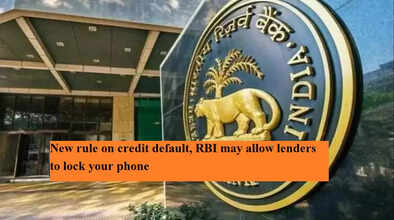New rule on credit default, RBI may allow lenders to lock your phone

RBI May Allow Lenders to Lock Borrowers’ Phones on Credit Default: What It Means for Consumers
New RBI Rule on Credit Default: The Reserve Bank of India (RBI) is reportedly considering a new regulation that could allow banks and lenders to lock mobile phones if borrowers fail to repay loans taken to purchase them. The move is aimed at curbing rising cases of bad loans and ensuring timely repayment.
How the Rule Would Work
Under the proposed framework, if a customer buys a phone on credit and defaults on repayment, the lender would have the authority to remotely lock the device. Importantly, lenders will not have access to the user’s personal data stored on the phone. The rule will only restrict the borrower from using the device until dues are cleared.
Borrower Consent is Mandatory
The RBI is expected to mandate explicit borrower consent before applying this rule. That means customers will have to agree to the condition at the time of availing credit. Without consent, lenders cannot lock the device.
Possible Benefits
-
Improved loan recovery: The measure could reduce the number of non-performing assets (NPAs) by ensuring borrowers take repayment seriously.
-
Easier access to credit: With reduced risk for lenders, even people with poor credit scores might find it easier to get small-ticket loans like mobile financing.
-
Financial discipline: Borrowers may be more cautious and timely in repayments, preventing their devices from being disabled.
Concerns Raised by Experts
Despite the potential benefits, some financial experts have raised concerns about the implications:
-
Restricted access: Since many Indians rely heavily on their phones for education, financial transactions, and essential services, locking devices could disrupt daily life.
-
Consumer hardship: For low-income borrowers, losing access to a phone could mean losing their main channel for work, payments, and communication.
-
Digital divide risks: Such measures may deepen the gap for vulnerable populations who already face challenges in accessing financial services.
What It Means for You
If the rule comes into effect, defaulting on a loan could mean losing access to your phone temporarily. This is expected to serve as a strong deterrent against missed payments. At the same time, the RBI will need to balance borrower protection with lender interests to avoid unintended hardships.
👉 Takeaway: The proposed RBI rule could reshape India’s digital credit landscape—making loans more accessible while enforcing stricter repayment discipline. However, for millions dependent on their smartphones, the risk of having their device locked raises important questions about fairness and accessibility.

